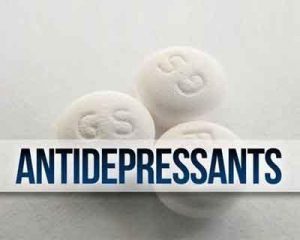- Home
- Editorial
- News
- Practice Guidelines
- Anesthesiology Guidelines
- Cancer Guidelines
- Cardiac Sciences Guidelines
- Critical Care Guidelines
- Dentistry Guidelines
- Dermatology Guidelines
- Diabetes and Endo Guidelines
- Diagnostics Guidelines
- ENT Guidelines
- Featured Practice Guidelines
- Gastroenterology Guidelines
- Geriatrics Guidelines
- Medicine Guidelines
- Nephrology Guidelines
- Neurosciences Guidelines
- Obs and Gynae Guidelines
- Ophthalmology Guidelines
- Orthopaedics Guidelines
- Paediatrics Guidelines
- Psychiatry Guidelines
- Pulmonology Guidelines
- Radiology Guidelines
- Surgery Guidelines
- Urology Guidelines
Antidepressants associated with significantly elevated risk of death

In a meta-analysis to assess the effects of Antidepressants on all-cause mortality and cardiovascular events in general-population and cardiovascular-patient samples,McMaster-led team of researchers found that they increase the risk of death. Antidepressant medications, most commonly prescribed to reduce depression and anxiety disrupt multiple adaptive processes regulated by evolutionarily ancient biochemicals, potentially increasing mortality. However, many ADs also have anticlotting properties that can be efficacious in treating cardiovascular disease.
It's widely known that brain serotonin affects mood, and that most commonly used antidepressant treatment for depression blocks the absorption of serotonin by neurons. It is less widely known, though, that all the major organs of the body--the heart, kidneys, lungs, liver--use serotonin from the bloodstream.
Antidepressants block the absorption of serotonin in these organs as well, and the researchers warn that antidepressants could increase the risk of death by preventing multiple organs from functioning properly.
The researchers reviewed studies involving hundreds of thousands of people and found that antidepressant users had a 33% higher chance of death than non-users. Antidepressant users also had a 14% higher risk of cardiovascular events, such as strokes and heart attacks. The findings were published today in the journal Psychotherapy and Psychosomatics.
"We are very concerned by these results. They suggest that we shouldn't be taking antidepressant drugs without understanding precisely how they interact with the body," says author Paul Andrews, an associate professor at McMaster University who led the research team.
Taken by one in eight adult Americans, antidepressants are among the most frequently used medications. They are often prescribed by family doctors without a formal diagnosis of depression, on the assumption they are safe. Since depression itself can be deadly--people with depression are at an increased risk of suicide, stroke and heart attack--many physicians think that antidepressants could save lives by reducing depressive symptoms.
However, McMaster researcher and co-author Marta Maslej, says, "Our findings are important because they undermine this assumption. I think people would be much less willing to take these drugs if they were aware how little is known about their impact outside of the brain, and that what we do know points to an increased risk of death."
Benoit Mulsant, a psychiatrist at the University of Toronto who was also involved in the study, says the findings point to the need for more research on how antidepressants actually do work.
"I prescribe antidepressants even though I do not know if they are more harmful than helpful in the long-term. I am worried that in some patients they could be, and psychiatrists in 50 years will wonder why we did not do more to find out," Mulsant says.
Interestingly, the news about antidepressants is not all bad. The researchers found that antidepressants are not harmful for people with cardiovascular diseases such as heart disease and diabetes. This makes sense since these antidepressants have blood-thinning effects that are useful in treating such disorders. Unfortunately, this also means that for most people who are in otherwise good cardiovascular health, antidepressants tend to be harmful.

Disclaimer: This site is primarily intended for healthcare professionals. Any content/information on this website does not replace the advice of medical and/or health professionals and should not be construed as medical/diagnostic advice/endorsement or prescription. Use of this site is subject to our terms of use, privacy policy, advertisement policy. © 2020 Minerva Medical Treatment Pvt Ltd